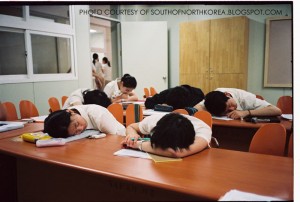
Sleep is important and necessary for human survival; however, people can’t seem to get enough of it– especially kids who are high school and college-age.
Sleep helps with learning and memory. It helps us to commit new information to memory through a process called “memory consolidation”. When we don’t get enough sleep, it is harder for us to remember things.
Not getting enough sleep can affect weight. The number of hours slept per night changes the level of hormones that affect appetite. This means that people who do not sleep enough tend to have slower metabolisms and, in turn, can become overweight.
Lack of sleep affects the moods that people are in. It can cause irritability, impatience, inability to concentrate and moodiness. Not enough sleep can also make a person too tired to do the things that he or she enjoys doing.
Sleep is linked to cardiovascular health. Sleep disorders or lack of sleep are connected to hypertension, increased stress levels and irregular heartbeat.
Basically, sleep is incredibly important. It is the time in which one’s brain ‘recharges’ for the next day. It allows people’s bodies to rest. Lack of sleep is like a car without an oil change– it won’t be able to function at peak performance. Cutting down on sleep too much could lead to a mental and physical ‘breakdown’.
At the beginning of writing this article, I challenged myself to take an entire 5-day school week and attempt to go to sleep at 10 p.m. every night. This means I needed to be in bed, lights out and phone off by 9 p.m. to give my body enough time to fall asleep.
Unfortunately, this didn’t happen. I wasn’t even close.
The closest I came to reaching the goal was falling asleep at 11:30 p.m., which gave me about six and a half hours of sleep. This made me realize just how hard it is for us teenagers to get the ‘recommended’ amount of sleep per night.
It may feel normal to doze off in a boring class, feel sleepy in the afternoons, or get tired after a meal; however, in reality, these are subtle signs of sleep deprivation. People may be sleep-deprived for so long that they don’t remember what it feels like to be wide-awake and fully alert.
On average, a healthy teenager (ages 12-18) needs between 8.5 and 10 hours of sleep per night to function well.
Unfortunately, the vigorous schedule of high school life prevents a majority of students from getting a full eight hours of sleep.
“I can only manage to get about 5 or 6 hours of sleep a night,” says Selo Kuvuna, a senior. “I really wish I could get 8, but with all the homework and football practice, I just really don’t have enough time. I feel fatigued and the day seems really long.”
Not getting enough sleep as a teenager can cause difficulties in school such as disciplinary problems, sleepiness in class and poor concentration.
Personally, I know how hard it is to get enough sleep. As a senior in high school, there’s never a time where I have nothing to do–I’m either at school, at volleyball practice, doing homework, or writing college applications.
Not getting enough sleep (and realizing it) made me feel exhausted and stressed. Since I’m not able to get sleep enough during the week, I end up sleeping in on the weekends until close to noon. From the research I’ve done, this isn’t a good sleeping habit– it doesn’t help me catch up on sleep, it only messes up my sleep cycle.
When I don’t get enough sleep, I can also tell that my mood changes. It makes me anger more easily and feel irritable. I know I’m not the only one who has this problem, and it’s frustrating.
It’s a cycle– students stay up too late to do homework and get less sleep. Then, they go to school the next day, fall asleep in class and make the teachers mad. It’s a no-win situation.
Trey Olson, a senior, is a slightly different case. “I dropped my first period, so now I get about 8 hours of sleep per night. So I feel fine in the morning, but around lunch time I start to get sleepy.”
A study led by Fred Danner, PhD, from the University of Kentucky concluded that hours of sleep per school night is significantly positively associated with GPA — students in this study that got more hours of sleep seemed to have higher grades.
What can we do about this?
If sleep is so important, why do we feel the need to sacrifice it for other activities? Sleep is what keeps our minds sharp and alert. So getting the right amount is important for our overall health.

Leave a Reply